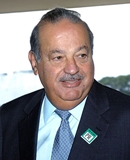Carlos Slim Helú, again ranked in 2012 as the world’s richest man, has been scaling back his involvement in his business interests recently and told Forbes magazine in a recent interview that his biggest goal is the fight against poverty. ‘To take poor people out of poverty and put them in the modern economy is very good for the economy, for the country, for society and for business. It is the best investment.’ Moreover, he thinks that ‘businessmen and entrepreneurs have more experience managing resources, and we can more easily solve the problems than politicians.’
This may smack of the belief common among very successful businesspeople that they could solve the problems of the world if only it were left to them, but Slim, of course, is not one to drift along with the tide. He reiterated in the Forbes interview his well-publicized scepticism about traditional charity. ‘I am convinced that the private sector needs to give support, not money, because charity has not solved poverty in hundreds of years.’ Instead, he sees the solution in digital tools for education to ‘create human capital’ and in healthcare. The latest initiative of his two foundations and Telmex is a system of digital libraries. ‘Now, instead of going to the library, you go to a digital library where you can navigate [computers] completely free … Instead of lending a book, we’ll lend a laptop for 15 days.’ There are presently some 3,500 such libraries and Slim’s aim is to enable 60 per cent of Latin America to have access to computers by 2015.
In terms of healthcare, Slim’s philanthropy ranges across a number of ambitious initiatives, including a 2010 five-year partnership with the Bill & Melinda Gates Foundation and the government of Spain to improve the health of the poorest 20 per cent of the population in southern Mexico and Central America. An abiding interest of Slim’s – and a personal one – is organ transplants. The Carlos Slim Health Institute has spent about $20 million since 2001 on organ transplants in Mexico, a nation with one of the lowest rates in Latin America for organ donations after death. Slim’s wife Soumaya died of kidney disease after a kidney transplant, and in 2008 his son Patrick was diagnosed with kidney disease. The family now campaigns for organ donation and has funded 7,100 transplants in the past decade.
Source
Forbes Magazine, 7 March 2012




Comments (0)